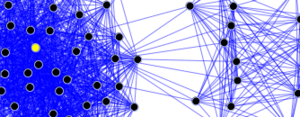
- Image via Wikipedia
Is the Web a Threat to Creativity and Cultural Values? One Cyber Pioneer Thinks So
Jaron Lanier rails against the social trends being fostered by the Internet–in particular its power to stifle creativity and grant anonymity as well as encourage groupthink and a lynch-mob mentality
To virtual reality pioneer Jaron Lanier, nothing less than our culture and highest moral values are at stake thanks to the World Wide Web and certain destructive online behavior it facilitates. As evidence, he points out that during the 17 years since the Web took off, those who live off their brains—most writers, illustrators and musicians, for example—have experienced a worsening economic situation. In Lanier’s view, content originators are only the first to feel the pain—their plight eventually will afflict everyone in the middle class, hampering their ability to earn money.
“Since more livelihoods should depend on brainpower as technology gets better, the direction we’re going in is universal impoverishment,” he tells Scientific American.
The disenchanted Lanier presents his views on Web-induced intellectual poverty, weighs in on whether information on the Web should be free (it shouldn’t, he thinks), identifies several more areas of the Web that he believes are deficient, and explores what it means to be a person in the digital age in his new book You Are Not a Gadget: A Manifesto (Knopf, 2010). He is hardly a Luddite and is renowned for creating innovative interfaces, including head-mounted displays that extended virtual reality’s use in medicine, physics and neuroscience. Lanier is still a big fan of the Internet; it is the way Web technology is designed and being used that dismays him.
Groupthink
Lanier claims ideology and the Web’s design—user interfaces and logins for example—marginalize individuals as “sources of fragments to be exploited by others.” Of particular concern is “hive thinking,” whereby personal expression counts for little and the creative process is harmed. Instead, he wrote, the hive mind esteems networked technologies and holds information stored in those networks—often referred to as “the cloud”—in higher regard than the people who create the information. Lanier worries that valuing the aggregate more than individuals will “leach” people of empathy and humanity.
Lanier, who is also a musician, is, for example, highly critical of “mashups,” montages of borrowed bits of works by musicians, artists and journalists. Mashers (the people who create mashups) ultimately do broad damage because they rarely understand the originators’ intents, according to Lanier; meanwhile artists can barely survive because they get no residuals for their work. In this way little original material is created and, consequently, our culture stagnates, Lanier wrote. “We can make culture and journalism into second-rate activities and spend centuries remixing the detritus of the 1960s and other eras from before individual creativity went out of fashion,” he wrote, “or we can believe in ourselves.”
Related articles by Zemanta
- Jaron Lanier Gets Old And Crotchety; Maybe He Should Kick Those Kids Off His Virtual Reality Lawn (techdirt.com)
- My bright idea: Jaron Lanier (guardian.co.uk)
- Nina Paley vs. Jaron Lanier (hermenaut.org)
- The Internet’s Extended Cultural Memory – Is It Sapping Our Creativity? (scholarlykitchen.sspnet.org)
![Reblog this post [with Zemanta]](http://img.zemanta.com/reblog_b.png?x-id=73ee7df1-195f-4ecb-924a-d0376ec05840)








